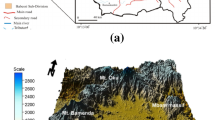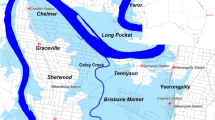Abstract
The National Flood Insurance Program (NFIP), an essential element of US flood management, has been modified by recent legislation to make it financially solvent. Primarily affecting policy types that have long been subsidized, the reconfigured program will result in these being converted to risk-based policies and this has produced concerns over policy affordability, especially for moderate- to lower-income households. The Homeowners Flood Insurance Affordability Act of 2014 does require the program’s administrator, the Federal Emergency Management Agency (FEMA), to develop an affordability framework and program to present to the US Congress for enactment. These NFIP changes are considered in the context of its historic challenges and through the lens of risk perception studies and their social justice implications. Studies show that perception of flood risk is conditioned by experience with flooding as much as by economic factors, and coupling of flood risk and climate change in FEMA communications is likely to be counterproductive. More deliberative and collaborative engagement with at-risk communities is important. The NFIP changes might exacerbate social injustice, but less so than a retreat from or dismantling of the program.
Similar content being viewed by others
Notes
Following Rawls, distributional social justice is concerned with socioeconomic equality or inequality, whereas procedural social justice is viewed as the regulation of the “fair equality of opportunity” that relates to the presence or absence of barriers to equal participation in society (Rawls 1971, 83).
Some second homes might represent investment properties, and for middle-income families or individuals using this as a hedge on retirement, this might represent a significant burden if the ability to liquidate such is constrained by BWA.
References
AECOM (2013) The impact of climate change and population growth on the National Flood Insurance Program through 2100. http://www.aecom.com/content/wp-content/uploads/2016/06/Climate_Change_Report_AECOM_2013-06-11.pdf. Accessed 28 June 2016
Arnell N (2000) Flood insurance. In: Parker DJ (ed) Floods. Routledge, London, pp 412–424
Association of State Floodplain Managers (ASFPM) (2016a) Background of the Certified Floodplain Manager Program, March 2016. https://www.floods.org/ace-images/CFM_History_03-22-16MM.pdf. Accessed 15 Dec 2016
Association of State Floodplain Managers (ASFPM) (2016b) Association of State Floodplain Managers NAI-No Adverse Impact Floodplain Management. https://www.floods.org/index.asp?menuID=349&firstlevelmenuID=187&siteID=1. Accessed 15 Dec 2016
Bankston CL III (2010) Social justice—cultural origins of a perspective and a theory. Indep Rev 15(2):165–178
Birkholz S, Muro M, Jeffrey P, Smith HM (2014) Rethinking the relationship between flood risk perception and flood management. Sci Total Environ 478:12–20
Boghani P (2016) FEMA announces Reforms to National Flood Insurance Program. http://www.pbs.org/wgbh/frontline/article/fema-announces-reforms-to-national-flood-insurance-program/. Accessed 29 June 2016
Brandon CM, Woodruff JD, Donnelly JP, Sullivan RM (2014) How unique was Hurricane Sandy? Sedimentary reconstructions of extreme flooding from New York harbor. Sci Rep 4:7366. doi:10.1038/srep07366
Breslin S (2015) Flood insurance rates to increase April 1 for thousands of homes alongU.S. coastline. The Weather Channel. http://www.weather.com/safety/floods/news/floodinsuranceratesincreased. Accessed 16 Dec 2015
Burby RJ (2001) Flood insurance and floodplain management: the US experience. Environ Hazards 3:111–122
Capstick S, Whitmarsh L, Poortinga W, Pidgeon N, Upham P (2015) International trends in public perceptions of climate change over the past quarter century. WIREs Clim Change 6:35–61. doi:10.1002/wcc.321
Congressional Budget Office (CBO) (2007) Value of properties in the National Flood Insurance Program. Pub. No. 2807. http://www.cbo.gov/sites/default/files/cbofiles/ftpdocs/82xx/doc8256/06-25-floodinsurance.pdf. Accessed 13 Nov 2016
Doocy S, Daniels A, Murray S, Kirsch TD (2013) The human impact of floods: a historical review of events 1980–2009 and systematic literature review. PLoS Curr. doi:10.1371/currents.dis.f4deb457904936b07c09daa98ee8171a
Etkin D, Ho E (2007) Climate change: perceptions and discourses of risk. J Risk Res 10(5):623–641. doi:10.1080/13669870701281462
Fainstein S (2000) New directions in planning theory. Urban Aff Rev 35(4):451–478
Federal Emergency Management Agency (FEMA) (2014) Homeowner flood insurance act overview. http://www.fema.gov/media-library-data/1396551935597-4048b68f6d695a6eb6e6e7118d3ce464/HFIAA_Overview_FINAL_03282014.pdf. Accessed 25 June 2016
Federal Emergency Management Agency (FEMA) (2016a) Participation in the National Flood Insurance Program. http://www.fema.gov/participation-national-flood-insurance-program. Accessed 15 June 2016
Federal Emergency Management Agency (FEMA) (2016b) Policy statistics. http://bsa.nfipstat.fema.gov/reports/1011.htm. Accessed 23 May 2016
Fier SG, Gatzlaff KM, Pooser DM (2014) The state of the National Flood Insurance Program: treading water or sinking fast? J Insur Regul 33(5):115–144
Flood of Ideas (2016) Flood of ideas. http://floodofideas.org.au/floods-happen/. Accessed 7 June 2016
Government Accountability Office (GAO) (2013) More information needed on subsidized properties. GAO-13-607. http://www.gao.gov/assets/660/655734.pdf. Accessed 29 June 2016
Government Accountability Office (GAO) (2014) Overview of GAO’s past work on the National Flood Insurance Program (GAO-14-297R Flood Insurance). http://www.gao.gov/products/GAO-14-297R. Accessed 15 June 2016
Grothmann T, Reuswigg F (2006) People at risk of flooding: why some residents take precautionary action while others do not. Nat Hazards 38:101–120
Harries T (2012) The anticipated emotional consequences of adaptive behavior impacts on the take-up of household flood-protection measures. Environ Plan A 44:649–668
Healey P (1992) Planning through debate: the communicative turn in planning theory. Town Plan Rev 63(2):143–162
Holladay JS, Schwartz JA (2010) Flooding the market: the distributional consequences of the NFIP. Institute for Policy Integrity, Policy Brief #7. New York: New York University School of Law
Kellens W, Terpstra T, De Maeyer P (2013) Perception and communication of flood risks: a systematic review of empirical research. Risk Anal 33(1):24–49. doi:10.1111/j.1539-6924.2012.01844.x
King RO (2013) The National Flood Insurance Program: status and remaining issues for congress. Congressional research service 7-5700, R42850. http://www.fas.org/sgp/crs/misc/R42850.pdf. Accessed 24 June 2016
Knowles SG (2014) Flood zone foolishness: politicians from disaster-prone states lead the fight against real disaster reforms. Slate. http://www.slate.com/articles/health_and_science/science/2014/03/biggert_waters_and_nfip_flood_insurance_should_be_strengthened.html. Accessed 15 June 2016
Knowles SG, Kunreuther HC (2014) Troubled waters: the National Flood Insurance Program in historical perspective. J Policy Hist 26(3):327–353
Knuffke G (2015) Why don’t property owners have flood insurance. Claims magazine. http://www.propertycasualty360.com/2015/10/05/why-dont-property-owners-have-flood-insurance. Accessed 26 June 2016
Kousky C, Kunreuther H (2014) Addressing affordability in the National Flood Insurance Program. J Extreme Events 1(1):1450001
Lopeman M (2015) Was Hurricane Sandy the 100-year event? State of the Planet. http://blogs.ei.columbia.edu/2015/05/20/was-hurricane-sandy-the-100-year-event-2/. Accessed 28 June 2016
Michel-Kerjan EO, Kousky C (2010) Come rain or shine: evidence on flood insurance purchases in Florida. J Risk Insur 77(2):369–397. doi:10.1111/j.1539-6975.2009.01349.x
Michel-Kerjan EO, Lemoyne de Forges S, Kunreuther H (2012) Policy tenure under the U.S. National Flood Insurance Program (NFIP). Risk Anal 32(4):644–658
Montz BE (2000) The generation of flood hazards and disasters by urban development of floodplains. In: Parker DJ (ed) Floods. Routledge, London, pp 117–127
Muckleston KW (1990) Integrated water management in the United States. In: Mitchell B (ed) Integrated water management. Belhaven Press, London, pp 22–44
Munoz C, Tate E (2016) Unequal recovery? Federal resource distribution after a Midwest flood disaster. Int J Environ Res Publ Health 13:507–524
Nance E (2015) Exploring the impacts of flood insurance reform on vulnerable communities. Int J Disaster Risk Reduct 13:20–36. doi:10.1016/j.ijdrr.2015.03.001
National Academy of Sciences (NAS) (2015a) Affordability of National Flood Insurance Program premiums, Report 1. The National Academies Press, Washington, DC
National Academy of Sciences (NAS) (2015b) Affordability of National Flood Insurance Program premiums, Report 2. The National Academies Press, Washington, DC
Randolph J (2012) Environmental land use planning and management, 2nd edn. Island Press, Washington, DC
Rawls J (1971) A theory of justice. Belknap Press, Cambridge
Wharton Risk Management and Decision Processes Center at the University of Pennsylvania (Wharton) (2016) Beta version: Flood Insurance Around the World. https://upenn.maps.arcgis.com/apps/MapSeries/index.html?appid=4fa76ed45f9f4ee5a5995c0ea7aef6f3. Accessed 7 June 2016
Whitmarsh L (2008) Are flood victims more concerned about climate change than other people? The role of direct experience in risk perception and behavioural response. J Risk Res 11(3):351–374. doi:10.1080/13669870701552235
Zhou W, Kunreuther H, Czajkowski J (2016) Affordability of the National Flood Insurance Program: application to Charleston County, South Carolina. Nat Hazards Rev 17(1):04015020
Author information
Authors and Affiliations
Corresponding author
Additional information
Editor: James Ford.
Rights and permissions
About this article
Cite this article
Shively, D. Flood risk management in the USA: implications of National Flood Insurance Program changes for social justice. Reg Environ Change 17, 1663–1672 (2017). https://doi.org/10.1007/s10113-017-1127-3
Received:
Accepted:
Published:
Issue Date:
DOI: https://doi.org/10.1007/s10113-017-1127-3




